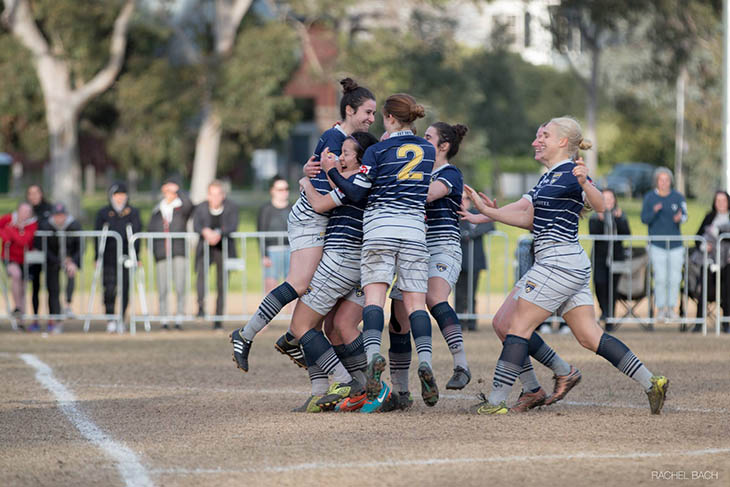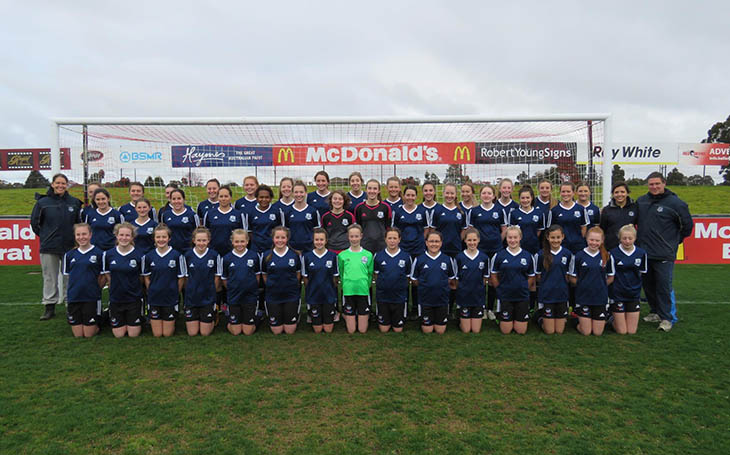Photo: Ballarat Eureka Strikers
Calder United President Eric Psarianos has spoken out about the FFV’s decision to introduce a 10th team in the NPLW Victoria, urging them to look regional in their plans for expansion in 2017.
It was one topic discussed amongst a host of talking points as the President gave his thoughts on Calder’s largely successful 2016 season as well as the re-signing of key players to be announced in the coming days.
The idea was initially presented in a meeting called by Victoria’s governing body on the 8th of August, which involved delegates from each of the current NPL licence holders. The decision to officially open up the application process was made two weeks later after being presented to the board, who signed off on the decision.
The FFV justified this with the official line of capitalising on women’s growth in the game, which saw an 11.1% increase in female participation from 2015 to 2016. They outlined in an official statement their desire to take into account both geographic location – to ensure a wide spreading catchment limiting any overlap of regions – while also requiring any applicant to have junior teams and structures in place that “do not impact existing NPLW clubs”.
Geographic structure of the 2016 Women’s NPL – Team details at @CornerFlagOz LINK http://t.co/T5342rmo9L pic.twitter.com/tYvmeI1J2g
— NPL Vic Football (@NPLVic_Football) September 2, 2015
Psarianos was amongst the delegates present in that meeting and believes the time is right for expansion, but the choice of location is paramount to the long-term future of the competition for every entity. While sustained expansion in the metro area he believes should be the “long-term goal”, in the immediate future, the time for regional expansion is right and “healthy for the sport”.
“My opinion is that I strongly believe that if we’re having expansion coming next year, that we should be reaching out regionally and expanding our geographical catch for players,” Psarianos said.
“Based on players who have been traveling to Calder from regional areas like Shepparton and Bendigo, that yes there is definitely enough talent there to have a pool of players. It’s also important for the existing metro clubs to be prepared to do a little bit more travel themselves to accomodate that. If you have a look, there are a lot of players who are in that Ballarat region who are very close to the same level as the junior girls around the metro area.
“If we’re going to be bold and brave, the FFV can do that by appointing a regional team. Looking at the success that Galaxy United have had this year as a regional based team – making the Grand Final and recruiting a high standard of player to the regional area – I think somewhere like Ballarat should have the chance before anybody else does as that region in particular and the facilities they have got can help grow the game properly and get a wide reach.
“I think [metro expansion] should happen down the line but I think the existing clubs need a chance to get their programs in order and working in order to create better players coming through the system. I think it needs another two years for that to happen.”
The threat of further spreading the talent available in metro areas was a real concern shared by the NPLW licence holders, despite the increase in female player participation. The concern shared was that despite the participation increase at grassroots level, the depth at an elite level is not reflective of the total growth and is not enough to sustain another team in a similar catchment zone.
“In hindsight, one of the things that was really evident in their endeavour to get a ninth team in was to capitalise on the growth of the game, particularly amongst females. They’ve seen an increase in participation which is fantastic, but I think the elite side of the womens game hasn’t caught up in terms of having enough depth, particularly in the metro area, to absorb more players in the elite competition.
“That was the issue everyone faced, because we’ve all started these entities and implementing these programs, which it’s a widely held belief that we’ll dilute [the talent pool] if another metro club is introduced. We haven’t had the chance to implement our programs and bring some youngsters up through these tailored programs to create elite players.
“It comes back to the point, expansion in the league is necessary, there’s no doubt about it. It should come but it just needs to be staged in the right way that allows the existing clubs to develop a higher talent pool before we bring in another metro club.
“If we have a look amongst our 15’s and 18’s, there’s still a fairly limited pool of players that could be playing senior football in the next two-three years and we need time to develop those girls. Bringing in another metro team now is just going to dilute that further and hopefully it doesn’t compromise the level of competition.
“It’s commonly acknowledged by all stakeholders that the introduction of NPLW in Victoria has been very successful, but itneeds more time to continue this positive establishment of an elite competition to support the W-League and Matildas.
“We need to be creating avenues for promising young players to learn their craft in Australia and not be tempted to go overseas because we cannot offer a more competitive and tailored avenue for their growth as elite footballers in Victoria.”
He further explored Galaxy as a case study for the basis of regional expansion, impressed from the outside, looking in by the direction they’re heading in regards to engraining a culture at the club where local girls are learning from some of the best senior players in the state. While Galaxy finished last on the NPLW ladder across each junior age group in 2016, Psarianos believes the talent is there – as it is in Ballarat – and just needs time to develop.

There are signs of this progression, with young midfielder-come-keeper Emily Kenshole impressing in her intermittent spurts in the first team, while Emanuella Fierro has joined the senior roster for 2017 after four substitute appearances last campaign.
“The recruitment of their senior team was the basis of being able to form a competitive team on the pitch, which then drew in the junior girls from the area,” he said.
“I think over the course of three-four years, those young girls that are coming in that are aspiring to play senior football in amongst some of Galaxy’s high-profile players is a good model to work with. I think that’s why Ballarat is an ideal location to follow a similar path.
“It’s up to every club to set up a system that is going to engrain a culture. Galaxy had a few local girls like Laura Spiranovic that came back. They had a couple of girls that have played in that region and that helps tremendously. That also fosters a culture within the club where the younger girls aspire to be just like them – that’s healthy.”
Psarianos also took the time to acknowledge those that worked alongside him in 2016 to provide Calder the foundation needed to enjoy a successful first season in the NPLW.
“I want to acknowledge a lot of the stuff that we’ve set up at the club in trying to run a national curriculum, bringing in a whole heap of new people. A lot of the people that came into the entity didn’t know each other, but we’ve still had what I’d call a successful year at the club, both on and off the field.
“There are a lot of good people within the football circle; if you bring them together and everyone pulls the right way, then you can achieve some very nice things in the game.”

